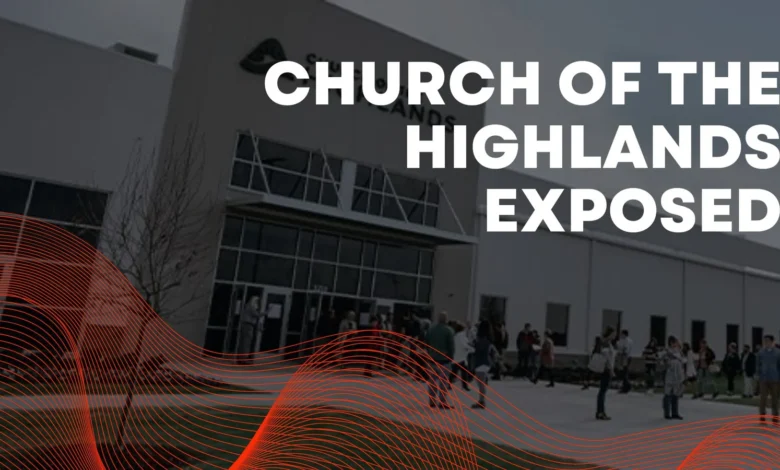Church of the Highlands Exposed: Investigating the Claims and Realities

Introduction to Church of the Highlands Exposed
Church of the Highlands has become a focal point for discussions on faith, community, and controversy. As one of the fastest-growing churches in America, it boasts a vast congregation and an impressive reach across Alabama and beyond. However, this growth hasn’t come without its share of scrutiny.
Recent allegations have emerged that challenge the church’s reputation. Critics argue that beneath its polished exterior lies a troubling reality involving discrimination and homophobia. At the center of these claims is Pastor Chris Hodges, whose leadership style has sparked intense debate among both supporters and detractors.
In this blog post, we will dive deep into what’s happening within the Church of the Highlands. We’ll explore various perspectives to uncover the truths behind these claims while examining their impact on members and the surrounding community. Join us as we investigate the intricate layers surrounding the Church of the Highlands: investigating the claims and realities that shape this prominent institution today.
The Controversy Surrounding Pastor Chris Hodges
Pastor Chris Hodges, the founder of the Church of the Highlands, has been a polarizing figure in contemporary Christianity. His charismatic leadership style and vision for church growth have attracted a large following but also drawn scrutiny.
Critics argue that his approach blends entertainment with spirituality, prioritizing mass appeal over deep theological teaching. Some believers feel this undermines traditional values within the Christian faith.
In recent years, Hodges faced backlash over certain public statements perceived as out of touch or insensitive. Social media platforms became battlegrounds where opinions clashed fiercely.
Supporters defend him vigorously, asserting that he strives to create an inclusive environment for all seekers. They view his methods as innovative rather than controversial. Yet each sermon delivered continues to ignite debate about what it means to be truly welcoming while staying true to biblical teachings.
Hodges remains unyielding amid these discussions, committed to his mission and vision for the church’s future.
Allegations of Discrimination and Homophobia
Allegations of discrimination and homophobia have surfaced against the Church of the Highlands, stirring considerable debate. Critics assert that certain church policies and teachings foster an unwelcoming environment for LGBTQ+ individuals.
These claims have not gone unnoticed. Former attendees report feeling marginalized or unwelcome when discussing their identities within the congregation. Some recount painful experiences during sermons that seemed to target or exclude them.
Supporters argue that these allegations misinterpret the church’s stance on traditional values. They insist that teachings are based on scripture rather than personal bias. Yet, this perspective does little to alleviate the concerns of those who feel hurt by what they perceive as intolerance.
The tension continues to grow as discussions about inclusivity evolve in society, leaving many questioning whether religious institutions can adapt alongside cultural changes without compromising their core beliefs.
Response from Church Leadership
Church leadership has been vocal in addressing the concerns raised by critics. They emphasize their commitment to inclusivity and love for all individuals, regardless of background or orientation.
Pastor Chris Hodges took to social media platforms, sharing messages aimed at dispelling rumors. He insists that the Church of the Highlands is a welcoming place for everyone.
Leadership also pointed out various community initiatives designed to support marginalized groups. These efforts include outreach programs and partnerships with local organizations focused on equality.
Additionally, they hold regular forums and discussions where congregants can voice concerns directly. This approach aims to foster an open dialogue within the church community.
Despite these efforts, some remain skeptical about how deeply these values are integrated into everyday practice. Tensions continue as both sides navigate this complex landscape of faith and perception.
Interviews with Former Members
Former members of the Church of the Highlands have shared a variety of experiences that paint a complex picture. Some recall moments of genuine connection and community, while others express feelings of disillusionment.
One former member described their initial excitement about joining. They highlighted vibrant worship services and supportive small groups. But as time went on, they felt an increasing pressure to conform to certain beliefs.
Another individual spoke candidly about feeling marginalized due to differing views on social issues. This person emphasized that discussions around faith often seemed one-sided, leaving little room for dissenting opinions.
These narratives reveal a blend of admiration and frustration within the church community. The stark contrasts in personal experiences raise questions about inclusivity and acceptance among congregants. Each story adds depth to the ongoing conversation surrounding this prominent Alabama church.
Impact on Community and Perception of the Church
The Church of the Highlands has long been a significant presence in its community. Its dynamic worship services and outreach programs have attracted thousands. Many view it as a beacon of hope and support.
However, recent controversies have cast shadows on this image. Allegations surrounding discrimination and homophobia have stirred strong reactions among both supporters and critics. This has led to polarized opinions about the church’s role in the community.
For some, it remains a place of refuge and spiritual growth. Others now see it through a lens tainted by fear and mistrust. Conversations are unfolding in homes, workplaces, and social media platforms, reflecting the divided sentiments.
These discussions shape how people engage with faith communities at large. The ripple effect is evident; trust takes time to rebuild when broken by controversy. One question looms: Can healing occur amidst such divisions?
Conclusion: The Truth Behind the Claims Against Church of the Highlands Exposed
The Church of the Highlands has become a focal point for both admiration and scrutiny. As with many large organizations, especially those in the religious sector, it draws passionate supporters and fervent critics alike. The allegations against Pastor Chris Hodges have sparked heated discussions about leadership accountability and inclusivity within faith communities.
Discrimination claims can fracture trust between church leaders and their congregants. For some former members, their experiences paint a picture of exclusion that contradicts the welcoming message often preached from the pulpit. Their voices add important context to understanding how institutional values translate into real-life experiences.
Church leadership’s public responses aim to clarify intent but often fall short in addressing individual concerns. This disconnect can lead to feelings of disillusionment among attendees who seek community support during vulnerable times.
The impact on local communities is multifaceted; while many still find solace in its teachings, there remains an undercurrent of doubt regarding its commitment to fostering an inclusive environment for all people.
As investigations continue and narratives unfold, discerning truth from perception becomes essential for anyone wanting to understand what lies beneath the surface at the Church of the Highlands Exposed. The dialogue surrounding these issues reveals deeper societal questions about faith, inclusion, and personal responsibility within spiritual spaces. These considerations will shape both current discourse and future engagement with this influential institution.


